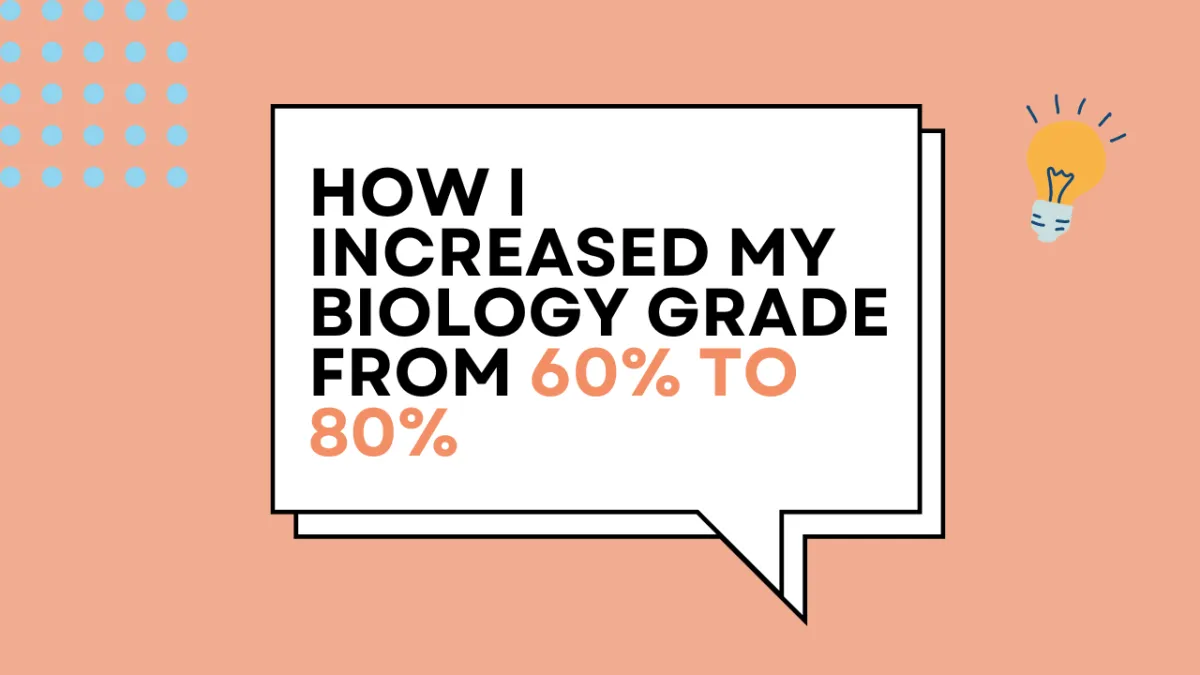
How One Simple Study Plan Boosted My Biology Grade from 60% to 80%=
I’ll never forget the sinking feeling of seeing a 60% on my Biology test.
It was a wake-up call, and I knew something had to change.
That’s when I decided to make a plan—how I would study and how often.
The results? An 80% on my next test.
But it wasn’t just about the grade—my stress disappeared, and I finally felt prepared.
Here’s how creating a simple study plan changed everything for me, and how it can do the same for you.
The Moment I Knew I Needed a Plan
Getting that 60% on my Biology 20 unit test hit me hard. I realized I wasn’t just underprepared—I didn’t know how to study effectively. Up until then, I’d been cramming last minute, hoping for the best. It clearly wasn’t working. I was constantly stressed, unsure of where to begin, and worrying about the exam was eating away at me.
That’s when I decided to change my approach. I needed a study plan that would help me not only study more often but also study smarter.
My Study Plan: How I Went from 60% to 80%
After realizing my old ways weren’t working, I made a study plan that was simple but effective. Here's what it looked like:
Break Down the Material:
Instead of trying to study everything at once, I divided the unit into manageable chunks. I used cue cards to organize the material, focusing on one topic at a time. Each set of cue cards had key concepts, terms, and definitions, which made studying much more structured and less overwhelming.
Daily Study Time:
During the school week, I dedicated 30 minutes every day to go through the cue cards. This consistent practice helped me retain information better without burning out. Since I focused on studying during the school week, I was able to take a break and relax over the weekend—giving me a nice balance between schoolwork and downtime.
Review and Practice:
I made sure to do all the practice questions assigned by my teacher and reviewed them carefully. Since my exams often had similar styles of questions, practicing these was crucial for understanding the format and improving my test performance. It wasn’t just about getting the answers right—it was about understanding why they were right or wrong.
Adjust As Needed:
Whenever I struggled with a concept, I asked my teacher for help. This made a huge difference, but if you need extra support, finding a tutor can be incredibly helpful. A tutor doesn’t just help with homework—they can become an accountability partner, pushing you to stay on track and study consistently. They can also personalize lessons to your pace, ensuring you fully understand the material, unlike the fast-paced environment of a classroom.
Ready to get that extra push? Schedule a free consultation call with a tutor who can create a personalized study plan just for you! Visit parktutor.ca/free-consultation-3330 to start.
Get Extra Help When Needed:
If you find yourself stuck on a certain concept, don’t hesitate to ask for help. Whether it’s your teacher or a tutor, getting clarification early can make a big difference. A tutor doesn’t just help with homework—they can guide you through difficult subjects, keep you accountable, and create a learning plan that fits your style.
Want personalized help in Biology, Chemistry, or another subject? Book a free consultation call with an expert tutor today at parktutor.ca/free-consultation-3330.
How You Can Create Your Own Study Plan
Creating a study plan isn’t just helpful for Biology—it’s a powerful tool you can use for any subject. In fact, when I applied this approach to Chemistry in grade 12, I was able to achieve a high 90% average. Here’s how you can create a study plan that works for you:
Assess Your Starting Point:
Look at your current grades and ask yourself where you need improvement. Understanding where you’re falling short helps you focus on the most important areas.
Break Down the Material:
Identify key topics for each subject and break them into smaller, more manageable sections. Organize your notes using cue cards or summaries, which will make it easier to review later.
Set a Study Schedule:
Choose specific days and times to focus on each section. If you're like me and find it hard to balance school and relaxation, consider studying during the weekdays so you can take the weekends off. Consistency is key, even if it's just 30 minutes a day.
Use Practice Questions:
Practice questions are an excellent way to gauge your understanding and prepare for the exam format. If your teacher provides practice questions, make sure to review them thoroughly—especially if they reflect the type of questions you’ll see on the test.
Get Extra Help When Needed:
If you find yourself stuck on a certain concept, don’t hesitate to ask for help. Whether it’s your teacher or a tutor, getting clarification early can make a big difference. A tutor can also help tailor lessons to your specific needs, giving you one-on-one guidance and pushing you to stay accountable.
Want personalized help in Biology, Chemistry, or another subject? Book a free consultation call with an expert tutor today at parktutor.ca/free-consultation-3330.
Final Thoughts
Making a study plan was the best decision I made to improve my grades. It didn’t just help me go from 60% to 80% in Biology—it also led to a high 90% average in Chemistry the following year. More importantly, it helped me feel confident, calm, and in control. If you're struggling with studying or feeling overwhelmed, creating a study plan could be your key to success.
Next Step
Ready to take your grades to the next level? Schedule a free consultation call with a tutor who can help you build a personalized study plan. Visit parktutor.ca/free-consultation-3330 and start preparing for success today!